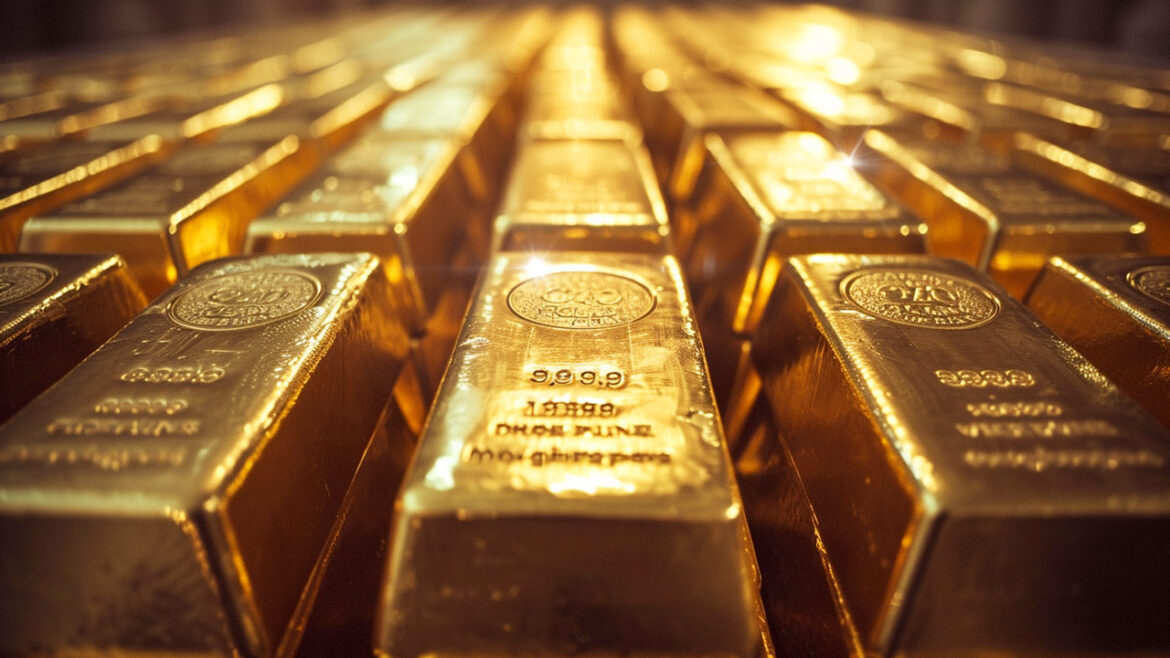Gold has all the potential to go unprecedentedly high. But silver will be gold on
Site:
Precious metals news
Citizens of Georgia, Kentucky, Wisconsin, and Kansas may soon enjoy lower taxes on precious metals if recently introduced pro-metal bills are made law in 2024.
The Hong Kong court has ordered the liquidation of the heavily indebted Chinese real estate giant, Evergrande. Judge Linda Chan's decision came after Evergrande's repeated failures to present a viable plan for restructuring its overwhelming debt, exceeding $300 billion. This ruling marks a crucial development in China's real estate sector crisis, although its impact on mainland China remains uncertain. Evergrande, once a symbol of the industry's turmoil, sought an additional three-month extension on Friday but was denied. Alvarez & Marsal Asia has been appointed as the liquidator to manage the process. The managing directors emphasized their focus on preserving as much of the business as possible through restructuring or continued operations. The situation has caused widespread concern in the investment community, drawing comparisons to the Lehman Brothers collapse and its triggering of the global financial crisis.
President Joe Biden vowed a response following a drone strike in northeast Jordan near the Syrian border, which resulted in the deaths of three American troops. The strike, attributed to Iran-backed militias, marks a significant escalation after several attacks against U.S. forces in the Middle East. This incident occurred amidst the ongoing Israel-Hamas conflict. Biden's statement came during a visit to South Carolina, where he observed a moment of silence for the fallen soldiers at a Baptist church banquet hall, highlighting the gravity of the situation and indicating potential future actions by the U.S. in response to this attack.
ANZ Bank's new report on gold and silver says despite short-term pressures, the medium to long-term outlook for gold remains bullish. The report also touches on the relationship between the U.S. dollar and Japanese yen and its impact on gold. As for silver, it's described as moving in harmony with gold, with its price influenced by gold's trends and industrial demand, especially from the solar industry
U.S. Treasury yields witnessed a decline on Monday, influenced by investor anticipation of the Federal Reserve's interest rate decision and upcoming key economic data. The 10-year Treasury yield saw a drop of 6 basis points to 4.098%, while the 2-year Treasury yield decreased by 3.9 basis points to 4.33%. This movement comes after the release of December’s personal consumption expenditures price index, showing a year-on-year rise of 2.9%, slightly below expectations. The focus is now on the Fed's upcoming interest rate decision this Wednesday, following the start of their meeting on Tuesday.
The durability of the U.S. economic expansion may largely depend on the Federal Reserve's strategy in the coming months. Historically, crises like stock market and housing crashes, and pandemics have disrupted economic growth. Currently, the Fed's challenge is to adjust interest rates adeptly to maintain economic momentum. Despite a decline in inflation, there's debate on the timing of rate reductions. The economy, while strong, shows signs of stress in household spending and job growth in limited sectors. Economists are concerned about the Fed's response to these evolving economic conditions, emphasizing the balance needed to support continued growth without triggering inflation.
In this week’s Market Wrap Podcast with Mike Gleason, the focus is on China's escalating gold purchases against a backdrop of seemingly positive economic data and stock market highs. Despite a reported 3.3% growth in the U.S. GDP for the fourth quarter, there's skepticism about the sustainability of this growth, with projections of a potential decline in the coming quarters. This uncertainty is partly fueling China's public to turn towards gold, highlighting a trend of increasing interest in precious metals as a hedge in times of economic instability.
Louis Vuitton Moët Hennessy (LVMH) has reported a remarkable financial year, achieving a record revenue of €86.15 billion, a 9% increase despite a sales slowdown in the latter half. The luxury group's success was bolstered by the reopening of Tiffany & Co's iconic New York store and the acclaim for Louis Vuitton and Christian Dior's fashion collections. Notably, LVMH's watches and jewelry division saw a 3% increase in sales, amounting to €10.90 billion, underscoring the robust appeal and enduring demand for its luxury brands amidst economic and geopolitical challenges.
Morgan Stanley's latest report delves into the future of the U.S. dollar amidst growing global scrutiny, particularly from the BRICS nations aiming to replace it as the world’s reserve currency. The report highlights the increasing challenges to the dollar's hegemony from various fronts, including BRICS, Central Bank Digital Currencies (CBDCs), Bitcoin, and stablecoins. These emerging financial technologies and alliances are pushing to establish their currencies and payment systems, posing a significant threat to the traditional dominance of the U.S. dollar in the global financial system.
This opinion piece from Paul A. London challenges the popular narrative crediting the Federal Reserve for the recent reduction in inflation. While inflation dropped from around 9 percent in mid-2022 to approximately 3 percent by January 2024, the article argues that this decline is largely due to factors outside the Fed's control. Key contributors to this change include the resolution of COVID-related disruptions, such as the normalization of supply chains, the reduction in shipping and trucking costs, and the stabilization of gasoline prices. The article emphasizes that improvements in supply, rather than monetary policy, have been instrumental in moderating inflation. This viewpoint suggests that while the Fed's role is often highlighted, the actual reasons for the decrease in inflation are more complex and rooted in the global economic recovery post-pandemic.
The U.S. economy stands out as a beacon of resilience and growth in a world where other major economies like Europe, China, and Japan are facing challenges. Despite the hurdles of the pandemic, high inflation, and international conflicts, the U.S. has shown a remarkable recovery, eclipsing its major trading partners. The economy not only bounced back from the pandemic but also managed to tame inflation, which has fallen to the Federal Reserve's 2 percent target. Additionally, the country witnessed a robust 3.1 percent economic growth over the past year, significantly outperforming 2022. This positive trajectory highlights the U.S.'s ability to navigate through crises and emerge stronger, effectively quashing fears of a looming recession. The success is attributed not just to chance but to strategic economic management, presenting a model for effective crisis response and recovery.
China's leadership has initiated several policies to stabilize its economy and prevent a financial crisis. These include a series of fiscal and monetary measures, such as freeing up billions for property lending and other spending, cutting bank reserve requirements, and introducing new rules to encourage bank loans to property developers. This move comes as a response to the economic slowdown and challenges faced by China's real estate sector, a key driver of its economy. The Chinese government is acting assertively to prevent a deflationary spiral and stabilize financial markets, crucial for global economic growth.
In the 2024 World Economic Forum in Davos, global leaders grappled with what's termed a "polycrisis," encompassing escalating geopolitical tensions, economic challenges, and climate change impacts. The interconnected nature of these crises, such as the impact of Houthi attacks on global shipping and drought-induced shipping limitations through the Panama Canal, exemplify how multiple crises are exacerbating each other. The situation in Gaza and ongoing conflicts in the Middle East, combined with high-stakes elections worldwide in 2024, add layers of complexity to the global economic landscape. Amidst these challenges, AI's emergence as a pivotal technological advancement was a key focus, highlighting the need for effective regulation and understanding of its global impact.
 A Pivotal Week for Stock Markets: Earnings, Fed Decisions, and Job Reports
A Pivotal Week for Stock Markets: Earnings, Fed Decisions, and Job ReportsJan 29, 2024 - 06:29:33 PST
This week is pivotal for stock markets, with a series of significant events on the horizon. Major tech giants like Microsoft and Apple are set to release their earnings reports, which could influence market dynamics. Additionally, the Federal Reserve's interest rate decision is eagerly awaited, with potential implications for future rate cuts. Moreover, the release of the January jobs report will provide critical insights into the labor market's health, influencing the Fed's rate cut schedule. These events collectively could set the tone for the stock market's direction in the coming weeks.
In a remarkable shift from the grim predictions of a year ago, the Federal Reserve is now weighing the possibility of interest rate cuts. Despite the raised rates to combat inflation, the economy defied expectations by avoiding a recession and maintaining a robust state. This unexpected surge has left Fed officials in a quandary about their next steps. While they previously anticipated rate reductions in 2023, the exact timing remains shrouded in uncertainty. The focus is now on whether these cuts will be announced as early as the Fed's upcoming March meeting or delayed till May or June. The current economic landscape, along with the upcoming presidential election, adds complexity to these decisions. Interestingly, inflation has cooled down, aligning with the Fed's target, fostering speculation about imminent rate cuts.
The Currency Heat Map is a valuable tool for understanding the relative strengths of major currencies in the forex market. It helps in distinguishing between actual currency strength and misleading trends caused by the weakness of other currencies. This perspective is crucial for accurate market analysis and making informed trading decisions
 Federal Reserve's Anticipated Moves and Corporate Earnings Drive Market Watch
Federal Reserve's Anticipated Moves and Corporate Earnings Drive Market WatchJan 29, 2024 - 06:08:48 PST
The financial market this week will be influenced by the Federal Reserve's meeting outcomes, key tech company earnings, and the January jobs report. Investors and analysts are closely observing these factors, as they can significantly impact the interest rate environment and overall market trends. The upcoming jobs report is especially critical, with expectations of 175,000 nonfarm payroll jobs added last month in the U.S.
Mike Maloney has made several moves in his portfolio, one of which he admits could be deemed as ‘completely crazy’.
Federal regulators are plotting a course that could see America's sturdiest banks tied to a sinking lifeboat. This plan, designed to compel banks to use the Federal Reserve's discount window, aims to normalize the act of reaching for this financial lifeline amidst turbulent seas. It's as if the Fed is asking the healthiest swimmers to don faulty life jackets first, in a bid to make them seem less alarming to those already struggling to stay afloat. Our guest commentator explains why this strategy, while intended to fortify the banking sector against future storms, would endanger all US banks.
Proverbs 22:7, ‘The borrower is servant to the lender,' has resonated in the background of my financial upbringing.Akin to other proverbs and parables (Proverbs 1:6), there’s much more beneath the surface worth pondering.











